Back to school for Jamaica's teachers?

By Dania Bogle, writing from Kingston
"Brain drain" was a major problem affecting the Caribbean during the 1970s and 1980s, but those days could be about to return.
Jamaica, for one, may soon see another upsurge in its youngest, brightest and most employable citizens setting their sights on foreign lands to earn a living.
The island already has the 12th highest emigration rate in the world, the United Nations Development Programme stated as far back as 2009.
And according to Planning Institute of Jamaica (PIOJ) statistics, 745,289 Jamaicans migrated to the US, UK, and Canada between 1970 and 2003.
The PIOJ's study shows that just 23.4% of the country’s tertiary graduates (89,060 of the 380,226 surveyed) were in Jamaica at the time of the study.
Today, a struggling economy and a high crime rate seem to be the major factors motivating Jamaicans who want a better quality of life to seek greener pastures elsewhere.
IMF pressure
The country's government recently signed a new loan deal with the International Monetary Fund (IMF). Not long after, the Jamaican dollar hit the $100 to US$1 mark in currency trading.
The IMF’s outgoing representative in Jamaica, Dr Gene Leon, recently told an editor's forum at the Jamaica Gleaner newspaper that the country had a 150% debt-to-GDP ratio and a net debt to other nations of approximately 125% of GDP.
What might not have been immediately evident to the average citizen soon hits home at the supermarket cash register.
And with Jamaican Education Minister Ronnie Thwaites announcing that the government would have to cut back on jobs in the classroom because of the IMF deal, hundreds of teachers' college graduates found this summer that they left with a diploma and not many options as to what to do with it.
Following the minister's pronouncement, the Ministry of Education staged a job fair on 13 and 14 August to help newly-trained and unemployed teachers find employment.
The only other choice for many may be to go overseas.
In fact, the president of the Teachers' Colleges of Jamaica, Garth Anderson, encouraged the 2,000-plus teachers expected to graduate over the next four years to do just that.
"The overseas market has always taken our teachers. Some of them are going to Australia and Japan and there are other avenues coming up [and] we encourage that, because it will benefit the country in another way," Mr Anderson told Caribbean Intelligence©.
Finding a job in the US
Kingsley Morgan, a second-year student studying Integrated Marketing at the University of the West Indies (UWI), said he had already been investigating the opportunities for migration once he graduates next year.
"Considering the difficulty in finding a job here in Jamaica and the better monetary compensation abroad, housing, environment, the political atmosphere, everything is just better for me abroad," he said.
The Jamaican government itself has often provided opportunities for its citizens to find employment overseas.
During a recent presentation in parliament, the country's Minister of Labour, Derrick Kellier, said that just over 11,000 people had benefited from the Overseas Employment Programme during the last year.
That figure included persons who had taken up farm work in the US agricultural sector, as well as the hospitality programme.
And Canada too
Another 6,000 had been placed in various programmes across the Canadian provinces of Alberta, British Columbia, New Brunswick, Newfoundland, Nova Scotia, Saskatchewan and Ontario.
The minister added that Jamaicans would further benefit in the future, as there was a high demand for other placements as trailer drivers, heavy duty technicians, mechanics and welders.
The programme accounted for Canadian $16m in remittances to Jamaica last year alone.
But those are the ones who may eventually opt to come back.
Statistics from Citizenship and Immigration Canada (CIC) reveal that 21,265 Jamaicans migrated to the North American country between 2002 and 2011.
That's an average of just over 2,000 a year.
The CIC in May opened its year-long window for applicants to its Federal Skilled Worker Program - a points-based programme which seeks to attract highly-skilled migrants to Canada.
Under the FSWP, the CIC will issue 5,000 visas to qualified individuals with experience that falls within its 24 eligible occupations.
Difficulties abroad
Finding a job in the developed world may not always be as easy as it appears from the outside, however.
Kirk Collash was laid off from his job with a local building society in 2011 after the first Jamaica Debt Exchange.
The youngster, who has a bachelor's degree in Environmental Science from UWI, searched for opportunities in the US and Canada before eventually starting his own catering business.
"It's hard to get a job in my field with just a master’s degree. I know I would have to be working to go to school over there and even when I was looking overseas, I really wanted to stay. My heart was always in Jamaica," he said.
The picture is also always not so rosy "up North".
Sertina McGregor migrated a year ago to Virginia in the US after completing a first degree in physiotherapy from the UWI.
However, she has been unable to find a job in her field without a master’s degree and other certification.
She ended up accepting jobs in Marshall's department store and at a rehabilitation clinic to help finance her expenses while she studies.
"I don't want to leave Marshall's as yet,” she said, “[I] want the discount."
Though she plans to return next year to get married, Ms McGregor admitted she would not come back otherwise.
"I would get less money," she said.
Related stories
